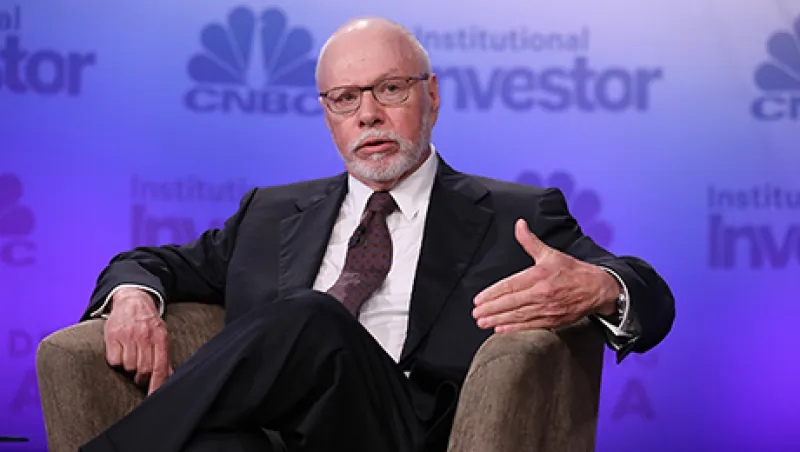Elliott Management Corp. founder Paul Singer is not known for his optimistic views on global markets, nor for his unwavering confidence in central bankers. The hedge fund manager’s quarterly letters to investors have variously promised imminent recessions, hyperinflation and most recently the “sudden and intense” breakdown of the global bond market.
Singer sounded the alarm once again in his keynote address at Tuesday’s Delivering Alpha conference, saying that post-crisis monetary policy created by central bankers in the developed world has created a massive bubble in the bond market.
“I think it’s a very dangerous time in the global economy and global financial markets,” said Singer, who blamed what he called “ever-increasing radicalism” in monetary policies for creating “a tremendous increase in hidden risk” in investors’ portfolios and for failing to stimulate growth. “I think we’re in the middle of a close to 40-year experiment in how leveraged can a system be and in how many ways,” he said.
The veteran fund manager’s observations are closely followed on Wall Street, in no small part because Singer runs one of the longest-running hedge funds in the business. Elliott, which manages $28 billion, has been in business since 1977 and has generated annualized returns of over 13.5 percent during that time, nearly 250 basis points above the return of the Standard & Poor’s 500 Index over the same period, with 1/3 of the volatility.
Elliott is a multistrategy firm, but it is best known for its distressed and activist investments. The firm frequently engages in pugnacious tactics, using the court system to effect the outcomes it wants. Singer is not afraid to sue governments, as it famously proved after buying Argentinian government bonds. Elliott was one of a handful of holdouts who refused to accept terms of two restructuring plans after Argentina defaulted on $95 billion of debt in 2001. Earlier this year Elliott and three other firms finally agreed to accept 75 cents on the dollar to settle the claim.
In the past Elliott has tussled with Peru, the Republic of the Congo and Vietnam (through its state-owned shipbuilder, Vinashin) — and has tangled with South Korea’s Lee family, which controls the Samsung conglomerate. More recently, Elliott filed suit in Nevada against Mossack Fonseca, the law firm at the center of the so-called Panama Papers scandal, for obstruction of justice related to the Argentinean debt case. (Elliott alleges that the firm schemed to hide Argentinean assets and that it concealed and destroyed evidence in the process.)
In his remarks at Delivering Alpha, Singer joked about his firm’s combative investment style. “What we do is mostly situational investing — buying a bond in a company and being in a multiyear struggle where we say, ‘ Our bonds are senior to yours,’ they say, ‘No they’re not,” and we go back and forth yelling about that for a few years.”
But in recent years he has become as well known for his gloomy market prognostications as his bitterly fought court battles. In his firm’s widely-publicized second-quarter letter to investors, Singer said he thinks the global bond market is “broken” and that low and even negative yields on government and other bonds have created “the biggest bond bubble in world history,” themes he reiterated on Tuesday. Singer has been a longtime, vocal critic of central banks around the world, particularly in the U.S., the U.K., Europe and Japan, saying they now yield too much power and that policy moves such as government bond-buying programs and negative-interest rate policies have created a scenario in which inflation is likely inevitable and could be hard to tamp down quickly once it gets going.
Singer, who has called central bank policy “monetary extremism,” has attacked the mentality that government bonds are considered a safe haven, a theme he reiterated at Delivering Alpha, urging investors to dump the long-term bonds of G7 countries.
Although the doomsday scenarios outlined in many of Singer’s investor letters of the past few years have not come to pass — yet — he was part of a group of money managers who met with G7 finance ministers in 2007 to warn them of cracks in the global credit markets. Singer told CNBC anchor Kelly Evans, who moderated the discussion, that he was struck by what he called the “amazing arrogance” of the policy makers. “They didn’t listen, treated us as ignorant children, and of course they didn’t do anything ... they had no idea of the risks that were building, the vulnerability of the financial institutions, the consequence of the leverage, derivatives, real estate boom, this self-reinforcing dance — so for me the credibility of the Fed and Treasury going forward was severely challenged.”
Singer said he thinks that monetary policies enacted immediately after the crisis were appropriate, but that central bankers around the world missed an opportunity in 2009 to pivot to policies that could restore growth to previous levels — namely regulatory changes and tax reform. The longtime Republican donor — who has refused to endorse Republican nominee Donald Trump — said he thinks that had Mitt Romney been elected president in 2012 instead of Barack Obama, he would have enacted policies that would have stimulated growth. He urged policymakers to do so now.
“With $15 trillion on major central bank balance sheets, you have a very delicate situation which cannot be solved by a sledge hammer,” he says. “You need something else. You can’t just raise interest rates without doing something else.”
Given the tone of Singer’s comments on the state of the bond markets, one could be forgiven for wanting to hide in a bunker, or at least engage in a little light doomsday-prepping, following his remarks. CNBC’s Evans asked Singer what investors should be doing today given the frightening scenario he laid out. In addition to dumping long-term government bonds, he also recommended the favorite investment of pessimists the world over, saying he thinks gold is “undervalued and underpriced in today’s world.”
Visit our Delivering Alpha channel for the latest on the conference. Follow #deliveringalpha on Twitter for real time updates, and follow Amanda Cantrell at @amandakcantrell.






